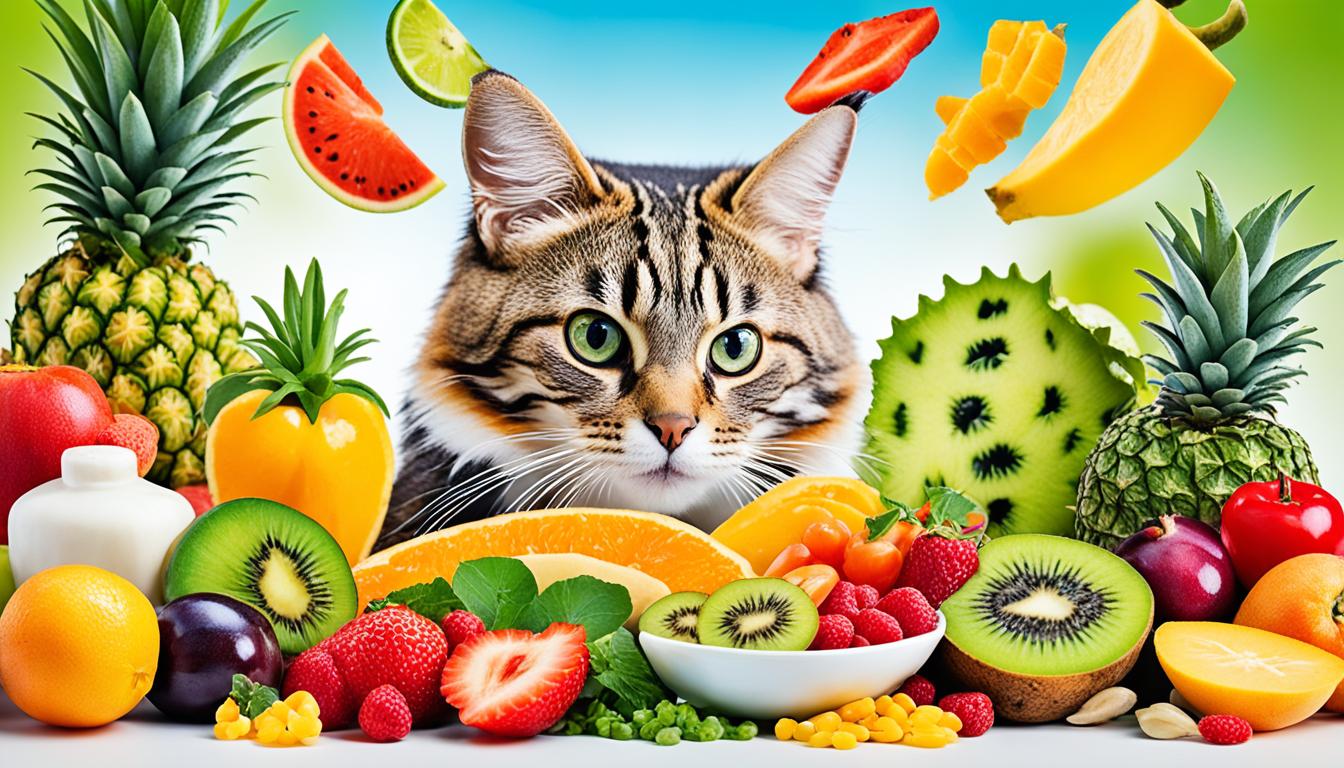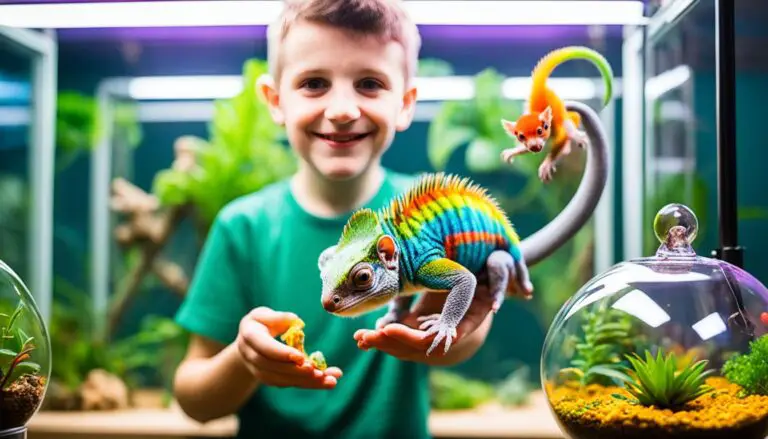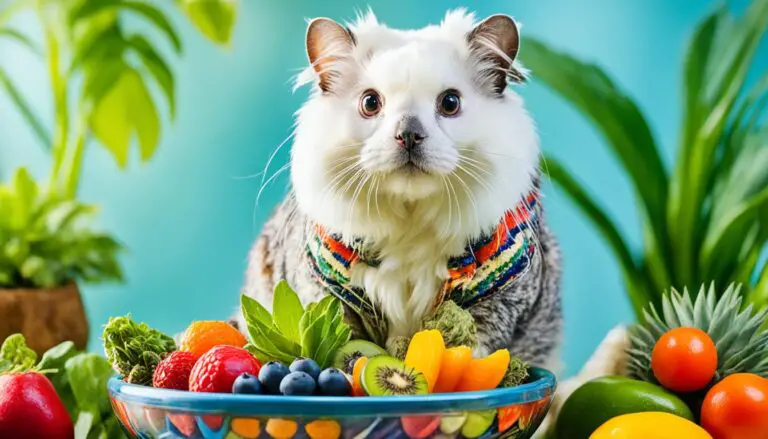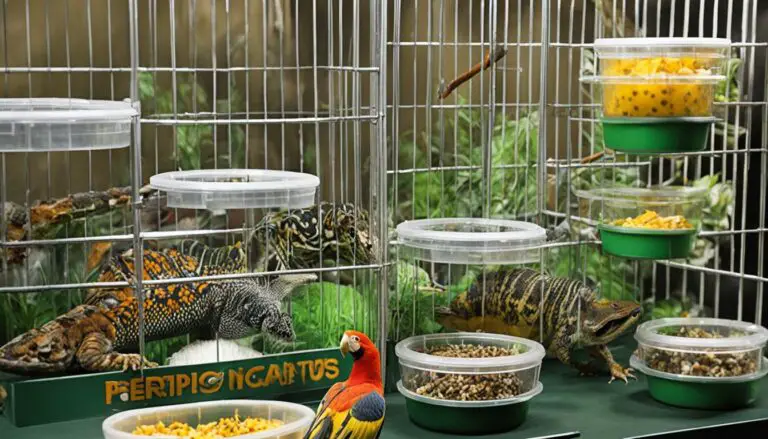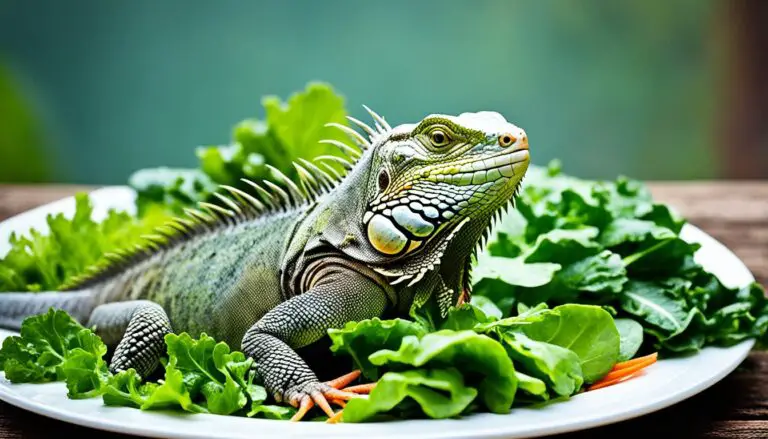Conquer Picky Eating Habits in Exotic Pets Effectively
Did you know that dealing with picky eaters among exotic pets is vital? These pets have unique food needs and tastes. Sometimes this can be tricky during mealtime. It’s important to get why they are picky and then tackle the issue. This ensures they stay healthy and happy.
Key Takeaways:
- Addressing picky eating habits is essential for the health of exotic pets.
- Understanding the dietary needs and preferences of each exotic pet is crucial.
- Overcoming food aversions can be achieved through gradual introduction and positive reinforcement.
- Consulting with a professional can provide valuable guidance in creating a balanced diet for exotic pets.
- Regular check-ups are important for monitoring and adjusting the diet as needed.
Common Food Aversions in Exotic Pets
Exotic pets, like people, might not like certain foods. They could avoid meals that are important for their diet. This might be due to how the food feels, smells, or tastes. It’s vital to overcome these dislikes to keep them healthy.
Exotic pets often have different likes and dislikes. For instance, a reptile might not want to eat a particular insect. Or a bird might pick out certain seeds. This variety in dislikes makes feeding exotic pets a challenge.
It’s key to know and deal with your exotic pet’s food dislikes. By adjusting their diet to what they like, you can ensure they get proper nutrition.
Figuring out why your pet dislikes certain foods is crucial. This could take some trial and error. But finding alternatives is important to meet their dietary needs.
Changing your exotic pet’s diet suddenly can upset their stomach. It’s better to introduce new foods slowly. This helps your pet get used to them without getting sick.
Experts, like veterinarians, can be a big help with exotic pets’ food dislikes. They can give specialized tips for your pet. This ensures they eat well and stay healthy.
Table: Examples of Common Food Aversions in Exotic Pets
| Exotic Pet | Food Aversion | Alternative Options |
|---|---|---|
| Reptiles | Refusal to eat certain types of insects (e.g., mealworms) | Alternative protein sources such as crickets or dubia roaches |
| Avian | Avoidance of specific fruits or vegetables (e.g., citrus fruits) | Offering a variety of other fruits or vegetables rich in essential vitamins |
| Small Mammals | Preference for only certain types of pellets or treats | Exploring different pellet or treat options to provide nutritional variety |
Understanding Picky Eating Behavior in Exotic Pets
Picky eating is common in exotic pets, for various reasons. These include bad past food experiences and sensitivity to certain food textures or flavors. Some exotic pets simply have a few foods they like, which can limit their nutrition.
To help exotic pets eat better, owners should understand what’s behind their picky habits. This way, they can find ways to improve their pets’ diets. For instance, creating good food memories through slow, gentle feeding can change their pets’ minds about new foods.
Often, exotic pets refuse food because it doesn’t feel or taste right to them. Owners should watch how their pets react to different foods. They can then adjust the menu to suit their pets’ unique likes and dislikes.
Exotic pets might also just like a small selection of foods. Although this may seem cozy, it’s not great for their health. To tackle this, owners can introduce new foods alongside their pets’ favorites. This strategy invites pets to broaden their tastes.

Overcoming Picky Eating in Exotic Pets: Tips and Strategies
When facing picky eating, patience and understanding are key. Here are some top tips to diversify your exotic pet’s diet:
- Start with small amounts of new foods.
- Mix in new foods with their favorites to help them accept change.
- Praise or reward them for trying new foods.
- Keep their feeding area quiet and calm.
- Seek advice from a vet or a pet nutrition expert for more help.
By following these strategies, you can guide your exotic pets to enjoy a wider range of foods. This ensures they get all the nutrients they need.
Creating a Balanced Diet for Exotic Pets
Providing the right food for exotic pets is vital for their health and happiness. It’s important to know what they need in their diet. This means looking at what they like to eat and what they avoid. With a diet made just for them, exotic pets can be healthy and happy.
To make a diet that’s balanced, there are key points to think about:
- Exotic Pet Nutrition: Just like us, exotic pets need certain nutrients to stay healthy. Investigate what your pet needs, in terms of food and amount, for their best health.
- Variety and Balance: A mix of food is important for a good diet. Make sure to include proteins, fruits, veggies, and some grains to cover all their needs.
- Supplements: Sometimes, pets need extra help to get all their nutrients. Talk to a vet or a pet nutritionist to see if your pet needs any extra vitamins or minerals, and how to give them.
- Meal Schedule: Having a set eating time can be great for your pet. It can stop them from eating too much or too little. This makes for a better diet for them.
Here is an example of a balanced diet plan for an exotic pet:
| Meal | Food | Portion Size |
|---|---|---|
| Breakfast | Insect protein (e.g., crickets or mealworms) | 10-15 pieces |
| Lunch | Fruits (e.g., apples or berries) | 1/4 cup |
| Dinner | Leafy greens (e.g., kale or spinach) | 1 cup |
| Snack | Grains (e.g., quinoa or brown rice) | 2 tablespoons |
Each exotic pet is different, so their diet should be too. Getting advice from a vet or a nutritionist can help you create the perfect diet. This way, your exotic pet will have everything they need to be healthy and happy.
Introducing New Foods to Exotic Pets
Teaching picky eaters to like new foods takes time and a good attitude. Slow but steady wins the race. Here’s how to help your exotic pet try new foods:
- Start with small portions: Give a little of the new food with their favorites. They get used to new tastes without being too much.
- Offer variety: Mix it up with fruits, veggies, and meat safe for them. This makes meals better and healthier.
- Use positive reinforcement: Tell them they’re good or give a small treat for trying new foods. This makes them more daring at mealtime.
Make sure the eating area is calm. Get rid of things that might distract them. Let them eat in peace. Most importantly, be patient as they get used to different foods.
“By gradually introducing new foods and using positive reinforcement, you can help your exotic pet overcome picky eating habits and embrace a varied and nutritious diet.”
—Dr. Emily Walker, Exotic Animal Nutritionist at AnimalCare Clinic
Every exotic pet likes different foods. Talk to a vet or a nutrition expert to find the best diet for yours.

| Benefits of Introducing New Foods to Exotic Pets | Tips for Successful Introduction |
|---|---|
| 1. Enhanced nutrition and balanced diet | 1. Start with small portions |
| 2. Prevention of nutrient deficiencies | 2. Offer variety |
| 3. Improved immune system | 3. Use positive reinforcement |
| 4. Greater food acceptance over time |
Dealing with Food Texture Aversions in Exotic Pets
Feeding exotic pets can be tricky if they turn up their noses at some foods. They might not like slimy or lumpy foods. This makes feeding them a balanced diet hard. But, knowing and working on their preferences is key to keeping them healthy.
Try changing how the food feels to get your pet to eat it. For instance, bake slimy food to make it dry and crispy. This tricks your pet into eating what they usually avoid.
Another trick is to mix different types of foods. Add crunchy bits to smooth foods or smooth out crunchy foods. This mix can make food more appealing to exotic pets.
Despite these challenges, you must still feed your pet the right nutrients. Getting advice from a vet or an animal nutrition expert is wise. They can guide you on managing your pet’s diet, even with texture changes.
Texture Modification Ideas:
| New Texture | Ideas |
|---|---|
| Crunchy | `-` Bake or air-fry vegetables and fruits for a crispy texture. `-` Offer freeze-dried insects or small crustaceans as a crunchy snack. `-` Provide hard rodent chews or insect exoskeletons as dental enrichment. |
| Smooth | `-` Blend fruits, vegetables, or cooked meat into a smooth puree. `-` Provide canned or wet food formulated for exotic pets. |
| Soft | `-` Steam or simmer vegetables to soften them. `-` Mix kibble with warm water to create a soft texture. |
| Crispy | `-` Dehydrate fruits and vegetables for a crispy texture. `-` Offer freeze-dried meat treats for a crunchy and crispy experience. |
Being patient is vital when changing your pet’s food textures. It can take a while to find what works. But, by slowly introducing and adjusting food, you can help your pet get used to new textures. This process is about trial and error, but it can make a big difference in your pet’s health.
Managing Food Smells and Flavors for Exotic Pets
Feeding exotic pets right means thinking about what smells and flavors they enjoy. These pets can be very picky. They sometimes really don’t like certain smells or tastes. Knowing what they prefer helps them stay healthy.
Some exotic pets might not like foods that taste bitter or sour. It’s key to keep this in mind. Avoid these flavors in their meals. Try foods that they find tasty instead.
Smells in their food matter a lot, too. Certain smells can either draw them in or turn them off. Using foods with subtle but pleasant smells can make them more interested in eating. This encourages good eating habits.
There are ways to make exotic pets’ food tastier. Adding a bit of new food to what they already like slowly introduces them to new flavors. Also, offering a wide range of foods helps keep their diet varied and healthy.

Expert Tip: Enhancing Food Appeal
“If your exotic pet has specific food preferences or aversions, try enhancing the smell and flavor of their meals. Adding natural herbs, spices, or even a small amount of pureed fruits or vegetables can make a significant difference in their willingness to eat.”
– Dr. Emily Martinez, Exotic Animal Nutritionist
Looking into what smells and tastes exotic pets like makes mealtime better for them. It’s smart to talk to a vet or a pet nutrition expert. They can help craft a diet plan that suits your pet’s needs and likes.
Overcoming Anxiety and Stress Related to Feeding in Exotic Pets
Feeding time can stress exotic pets, especially if they’re picky. It’s hard to give them all nutrients when this happens. Yet, with a stress-free eating area and a few tricks, you can lessen their worries. This makes feeding a better experience for them.
Creating a Stress-Free Environment
It’s key to keep feedings calm for exotic pets. Here’s what you can do:
- Choose a quiet spot, away from noise.
- Stick to a steady feeding schedule.
- Keep the eating place tidy and calm.
A peaceful setting makes pets enjoy their meals more.
Avoiding Pressure During Feeding
Pushing them to eat more can make their anxiety worse. Instead, try these tips:
- Give them a range of foods they like.
- Use positive ways, like praise, to get them to eat.
- Let them eat at their own speed.
This gentle method can make your pet less anxious. They might even try new foods.
Seeking Professional Guidance
If feeding issues stress you or if their diet worries you, get help. A vet or a nutritionist for exotic pets can offer great advice. They can tailor a plan to fit your pet’s needs.
| Benefits of Overcoming Anxiety and Stress | Tips for a Stress-Free Feeding Environment |
|---|---|
|
|
Helping your exotic pet deal with feeding stress is crucial for their health. It ensures they get the needed nutrients for a healthy life.
Seeking Professional Help for Exotic Pets with Severe Picky Eating Habits
Exotic pets sometimes become very picky eaters, needing help from professionals. A veterinarian or an animal nutritionist can give great advice. They specialize in exotic pets and their needs.
These experts know a lot about exotic pet nutrition and can help with food aversions. They check the pet’s health overall, find any lacking nutrients, and create special diets that fit the animal’s needs.
“Professional help is vital for exotic pets’ picky eating issues,” says Dr. Samantha Greenfield. She’s a top vet who focuses on exotic animals. “We must act fast to avoid health problems and help pets eat well.”
In a session with the vet or nutritionist, the exotic pet gets a full check-up. This includes looking at their health history, a physical, and what they usually eat. They use this to make a detailed plan to fix the picky eating.
Some pets need time to get used to a new diet. The expert will show how to do this. They will suggest new foods, portion sizes, and adjust the diet to suit the animal’s special nutritional needs.
“Being patient and understanding is key,” says Dr. Greenfield. “Each exotic pet is unique, and solutions vary. With professional help, your pet’s health comes first.”

| Tips for Seeking Professional Help | Benefits of Professional Guidance |
|---|---|
|
|
The Importance of Regular Check-Ups for Exotic Pets
Regular check-ups are key to an exotic pet’s health and happiness. These visits help vets keep an eye on their food needs. They make sure pets are eating well and their meals are healthy.
At check-ups, vets will look at everything. They check the pet’s weight and look for any problems with how they eat. This means they can catch and fix food issues fast.
Exotic pet vets know a lot about special diets. They can help make sure your pet gets the right food they need. They can also give tips for a balanced diet.
“Regular check-ups for exotic pets are vital in identifying and managing any underlying dietary issues. By addressing these issues early on, we can ensure that exotic pets receive the proper nutrition and care they need for a healthy and fulfilling life.” – Dr. Amanda Rodriguez, Exotic Animal Veterinarian
Check-ups are also about more than food. Vets check teeth, watch weight, and help prevent parasites. They might suggest supplements to keep pets healthy.
The Benefits of Regular Check-Ups for Exotic Pets:
- Keeping an eye on overall health and happiness
- Fixing food issues
- Helping with the perfect diet
- Offering tips to eat better
- Checking teeth and weight
- Stopping and treating bugs
- Making sure pets have great food for a happy life
By getting check-ups, pet owners help a lot. They make sure their pets eat right and stay well. Seeing a vet who knows about exotic pets is really helpful. They give great advice on food and eating problems.
| Exotic Pet | Recommended Frequency of Check-Ups |
|---|---|
| Parrots | Every 6-12 months |
| Hedgehogs | Every 6-12 months |
| Reptiles | Every 6-12 months |
| Rabbits | Every 6-12 months |
| Guinea Pigs | Every 6-12 months |
Ensuring a Healthy Transition in Exotic Pets’ Diets
When changing your exotic pet’s diet, go slow and be careful. Sudden changes can upset their stomachs. This makes them uncomfortable. To switch to a new food safely, follow a few key steps.
- Consult a professional: Always talk to a vet or an animal nutrition expert first. They know what exotic pets need. They will help you pick the right diet for your pet.
- Introduce new foods slowly: Add a little of the new food to what they already eat. This allows them to get used to it without getting sick.
- Monitor their response: Watch how your pet reacts to the new food. If they show any issues, like tummy troubles, call your vet for advice.
- Implement a balanced diet: Make sure the new diet covers all your pet’s nutritional needs. These special diets are designed to keep exotic pets healthy and happy.
“A gradual transition to a new diet is essential for exotic pets to avoid digestive upsets and ensure their well-being.”
Each exotic pet is different, so their diet change might be unique. Getting advice from an expert is the best way to tailor a diet plan. A good diet will help your exotic pet live a long and joyful life.
| Diet Transition Tips for Exotic Pets |
|---|
| Consult a professional before making any changes |
| Introduce new foods gradually |
| Monitor your pet’s response and adjust as necessary |
| Ensure the new diet meets your pet’s specific needs |
Conclusion
Dealing with picky eating and food aversions in exotic pets needs deep knowledge of their diets. We must understand what they like and dislike. Then, we can make a diet that’s good for them.
It’s important to help them get used to different foods. We can help them like more foods by slowly adding new items. This can make their diet healthier.
Setting up a good eating area is also key. If we make mealtimes calm and enjoyable, they might eat better. This approach can improve their diet and how they feel.
Helping exotic pets eat better takes time and a smart plan. But with effort, we can make sure they eat what they need to be healthy.
FAQ
How can I address picky eating habits and food aversions in my exotic companion animals?
What are some common food aversions in exotic pets?
How can I understand and address picky eating behavior in exotic pets?
How do I create a balanced diet for my exotic pets?
What is the best way to introduce new foods to picky eater exotic pets?
How can I overcome food texture aversions in exotic pets?
How can I manage food smells and flavors for my exotic pets?
How can I reduce anxiety and stress related to feeding in exotic pets?
When should I seek professional help for my exotic pets with severe picky eating habits?
Why are regular check-ups important for my exotic pets?
How can I ensure a healthy transition in my exotic pets’ diets?
Source Links
- https://www.webmd.com/food-recipes/ss/slideshow-picky-eating
- https://vcahospitals.com/know-your-pet/feline-picky-eaters
- https://www.ncbi.nlm.nih.gov/pmc/articles/PMC10675136/
Peter Stones is the founder of Exotic Pets Place, the leading online resource for exotic pet care information.
With over 10 years of hands-on exotic pet ownership experience, he is deeply passionate about sharing his expertise to help others properly care for their unusual pets.
When he's not writing extensively researched articles or connecting with fellow exotic pet enthusiasts worldwide, you can find Peter at home tending to his own beloved menagerie of exotic animals.

